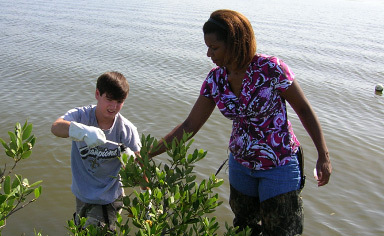|
The Thrill of Discovery |
In the summer of 2010, Joey, one of the SumRI interns, made his own discovery - that there is a relationship
between the age of the blue crab and the densities of vibrios in its tissues, and also that the vibrio densities
varied with the tissue types. "This is on a programmed ratio, not simple measurements," says Crystal. "He actually
did the dilution factor and figured out that the bigger the crab the more bacteria. His hypothesis makes sense."
Joey hopes to be an REU fellow next year and continue his research. "It’s very exciting and eye-opening; he did it
on his own," says Crystal. "We'll hold his discovery, and if I can talk him into coming back next summer then that's
his project." [Update: Over the summer of 2011, another SumRI intern is following up on Joey's work and is trying
to find out what the impact of the Mississippi River floods have been on the vibrio communities in blue crabs.] |
|
|
| |
Dr. Crystal Johnson had developed a Summer Research Internship for High School Students (SumRI) while at the University of
Southern Mississippi, and brought it with her to LSU. When she first arrived on the LSU campus as an Assistant Professor,
not knowing anyone yet, the only way she could think of to find high school students to come work in her lab was to email the
local high schools. All the high schools. "I spent two weeks combing the internet," she says. "I went to websites and
contacted principals and teachers." Her determination paid off.
"Things do break, but when you’re committed to outreach you just build that into
the budget. The result greatly outweighs the price." |
"That first year two high school students – Jaclyn and Caitlyn – worked on their own projects, got results and did
presentations at the end of the summer," says Crystal. The following summer Jaclyn received a
Research Experience for Undergraduates
(REU) fellowship to work in Crystal's lab. "She's been an especially good role model and mentor for the high school students,"
says Crystal, "because she was in their shoes just last year." The first year of SumRI at LSU was a success, so Crystal repeated
it the next summer, engaging two more high school students – Trevor and Joey. (See box.)
Crystal had been a
GK-12 Fellow as a grad
student, and since then had always wanted to work with high school students. "I would take modules out to the high schools and
it was lots of fun," says Crystal. "I knew I would have the ability to do it, and I also knew NSF favors grant proposals that
do a lot of outreach." For Crystal, the energy and excitement of the young students is contagious, and helps her approach her
own work in new ways. "One of the things I learned from interacting with high school students is they have this 'who cares'
attitude," she says. "It helped teach me how to make it important, how to explain why it's important, why you should care,
and I think that's helped with my grant proposal writing."
Not all professors see it the way Crystal does. They think of the liability, and the potential expense of breakage. "Things
do break," says Crystal, "but when you're committed to outreach you just build that into the budget. The result greatly
outweighs the price."
The SumRI experience ends with a presentation to other faculty, so that Crystal's peers can see that the students are doing
real science. "If my colleagues see real discoveries taking place then maybe they'll invite REU participants to their labs,"
says Crystal. "Once you find a good student you want to keep them coming back."



